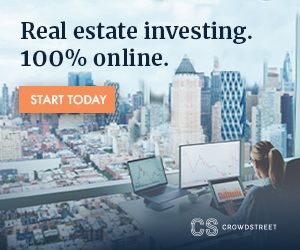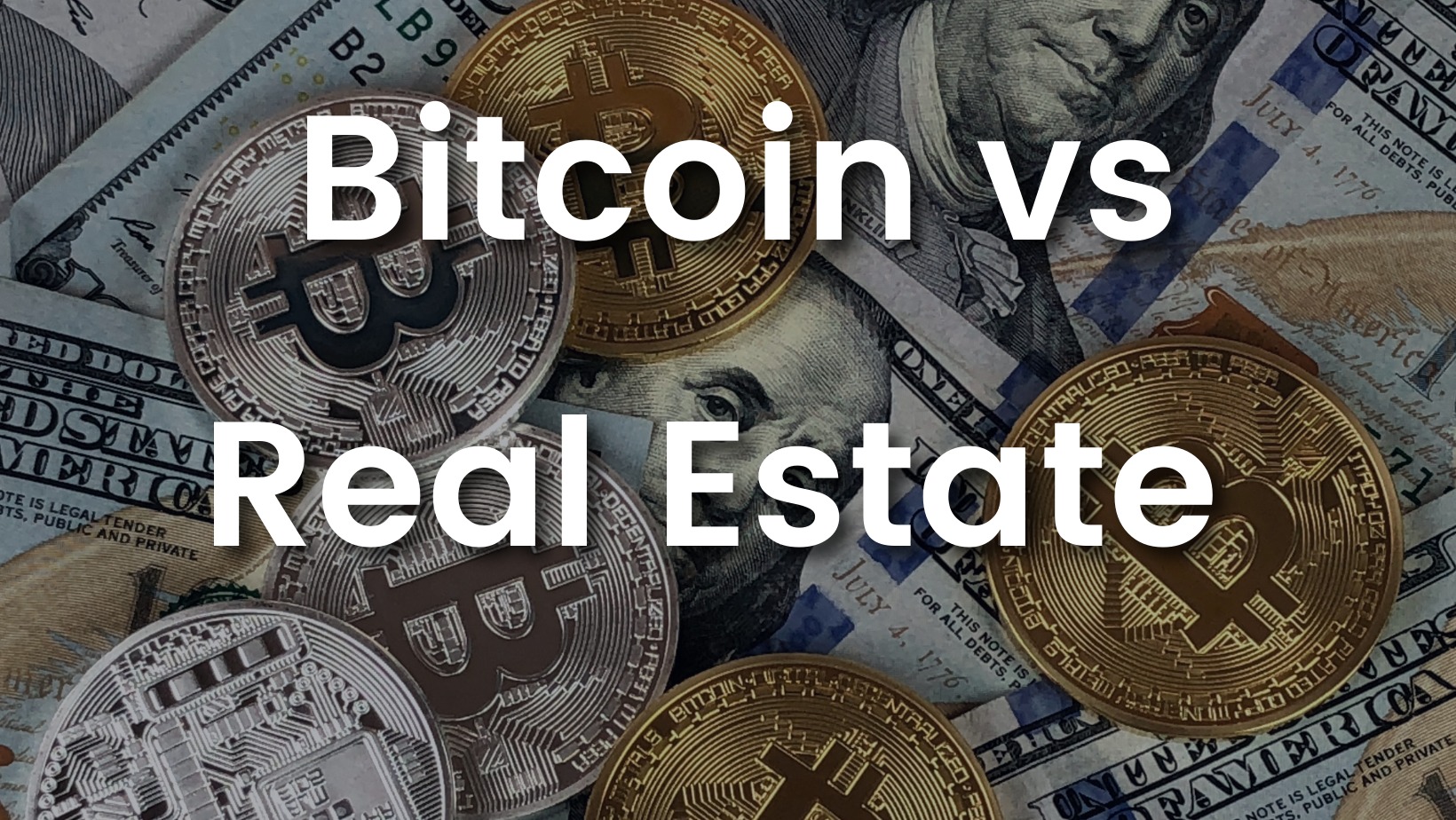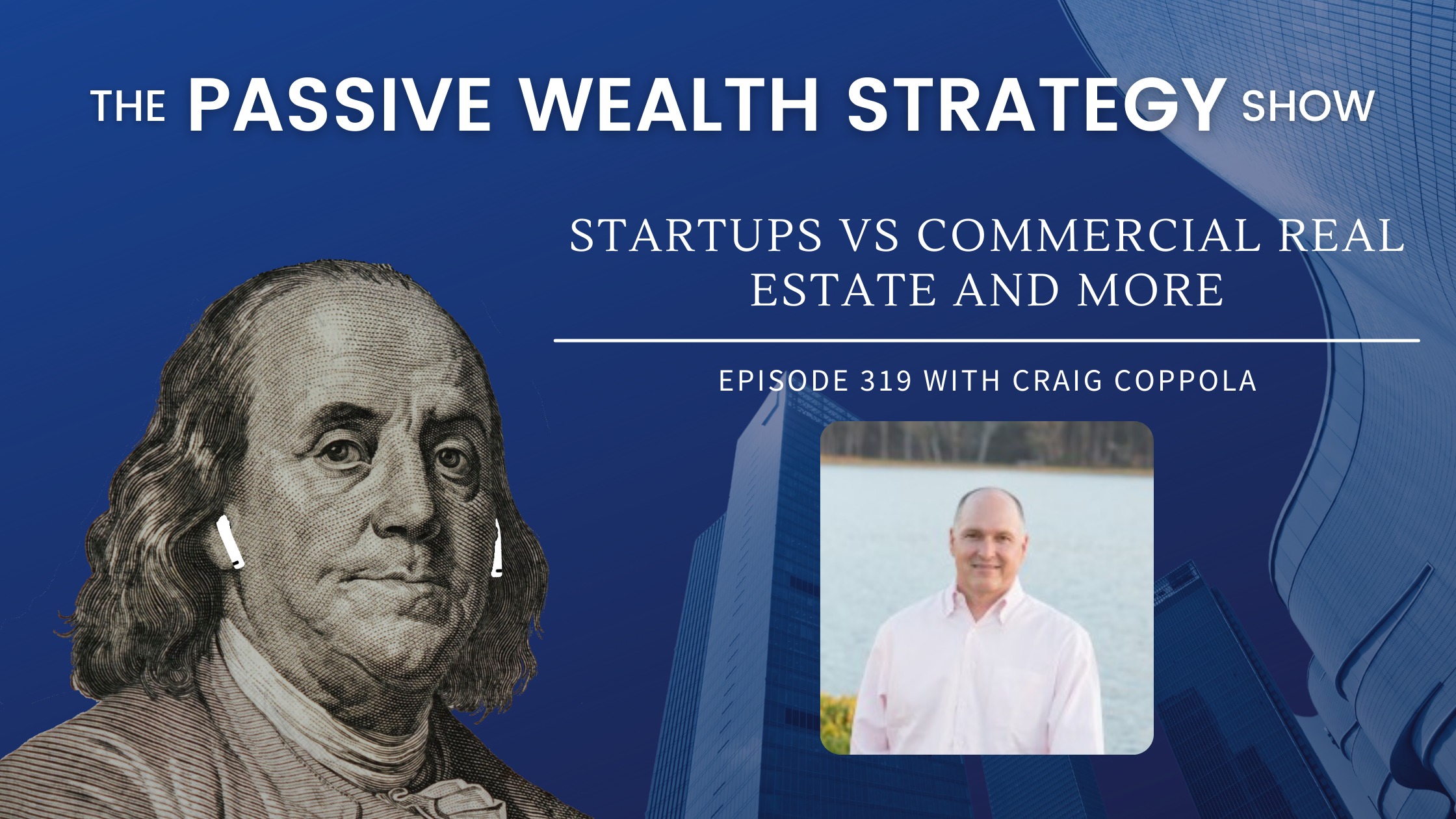
Startups vs Commercial Real Estate and More with Craig Coppola
Craig, thank you for joining us today.
Thanks, Taylor. Really excited about the next out.
Hey, I’m excited as well. I’ve, you have such a fantastic amount of experience for our listeners out there who don’t know about you and your background. Can you tell us about, where you come from and what you’re up to these days?
Sure. So I‘m from Arizona, so I’m out here in Scottsdale, Arizona, but I was born in a small town in Southern Arizona. From six kids. I was a third of six kids and I’m really the black sheep of our family. I’m the only entrepreneur, both of my parents were high school teachers. And three or four of my siblings are still in the same town and, God nice careers and all that, but I’ve been an entrepreneur since 19 83, 19 84.
And my background is I started. I played for one year. And you could see in the background, I got drafted out of college and played one year of minor league baseball for the twins and then got released. And I was trying to figure out I didn’t like the fact that, in baseball, they tell you they can dictate your career for you.
The people that run the organization, which are great. So I didn’t want to do that. So I wanted a career where. Could dictate my own career. And so I, at the time I had no capital, no nothing back in the early eighties. And so I got my job. It wasn’t my first job, but I really worked my way into commercial real estate brokerage.
So I started out as a hundred percent commission sales guy in 1985. And then in 1991, we started lean associates, Arizona. We just celebrated September our 30th anniversary. So I’ve been an entrepreneur, started our own company. There were seven other guys who started with. Since 1991. And that’s what I’ve been doing for 37 years is being a real estate broker.
And along the way, I’ve diversified and I’ve started acquiring real estate. I’m only my own. And one of the reasons why we started leading. And one of the reasons why I went to Lee was so that I could acquire real estate for my own account. Because when you get to the big shop, I was with a company called Grubb and Ellis, which is like CVRE or Cushman and Wakefield.
They’re pretty tough on buying real estate for your own account. And Lee, Billy was exactly the opposite. So I’ve been acquiring real estate on my own account for at least 30 years now. And it’s been a really nice ride.
That’s awesome. That’s awesome. I love talking with folks like yourself that have, decades’ worth of experience in real estate.
And I think that. Help us see where we stand today and maybe understand where we’re going or where we might think we’re going in the future. Now the there’s this topic of how to win in commercial real estate. I want to talk about this and your, your book and everything. And then also, learn more about investing in startups like you had and compare and contrast real estate investing as compared to startups, because as folks.
More into a niche, investing startups become an option. And I think comparing commercial real estate versus startups is relevant because those are options that people are looking at. So let’s talk about how to win in commercial real estate investing.
Yes. Yeah. So I wrote this, I wrote my first book. I’ve got five out now and a couple on the way, but the first book was how to win in commercial real estate investing and the real digest of this.
Everybody wants the magic bullet. Everybody wants to just pay how what’s the secret. Can I buy liens? Can I go out and do this or do that? And my posture is, look, find a niche that you really want. Find something that is really near and dear to you learn it, explore it. And that’s what the book is all about.
Here’s what you do on a weekly basis to learn the marketplace. Do you want to buy your first deal? And it’s a DuPont. Where do you want to buy that? What niche do you want to know? Know the streets? Drive the marketplace at night. Drive it on Saturday mornings. I used to drive Sunday mornings.
What’s it feel like in the morning? What’s it feel like Friday night? And then you can start once you start learning the marketplace. Now I’ve been fortunate because this is what I do. I’m in the business all day, every day. So the questions
that I always get asked from people that are outside the businesses, how do we get into it?
And that’s my first answer is start really understanding it and taking time everywhere you drive, there’s a commercial real estate opportunity. And so we have to start looking at that. And I’ve been blessed because, I’ve been involved in its 60 hours a week for 37 years, but I also have taken all of my free time and started thinking about that.
So from a real estate standpoint, I think the first answer is really to know what you want you can’t. And this is counter to what some of these national folks are saying. I don’t acquire property outside of my market. That I know, unless I have someone like you in that marketplace, like I was just, I’m just on an email.
I’m investing in some apartments in Florida. And so I’m investing with this person, but I’ve known him for 30 years. We used to work together. I’ve invested with him for the last decade. And so I will take his advice over, other people that I don’t know. So I don’t tend to, and I would tell you, you and I were talking before this story I am, I’m Robert and Kim Kiyosaki is commercial real estate guy.
They have an apartment investor that they invest with. But if there’s a commercial real estate deal, they’ll call me and we co-invest together. I’ll bring them transactions and Robert and Ken, aren’t doing, if someone just throws them a deal, they aren’t taking it. Willy nilly. They have just a few people that they trust and have learned to trust over years.
And that’s what they do. And I think that’s one of the key things is start developing. What you want to buy and developing the relationships of people that you trust officers.
I really appreciate that you kinda, you said to understand what you want to buy, and it wasn’t just in the sense of that particular asset, but you also talked.
Geographically. And I think these days we hear a lot of folks saying, Hey, I want to get into multi-family and I’ve got this list of 20 markets that I’m focusing on and that’s just not really realistic. That’s not focused.
I can’t understand how somebody you’re on the east coast, I’m on the west coast.
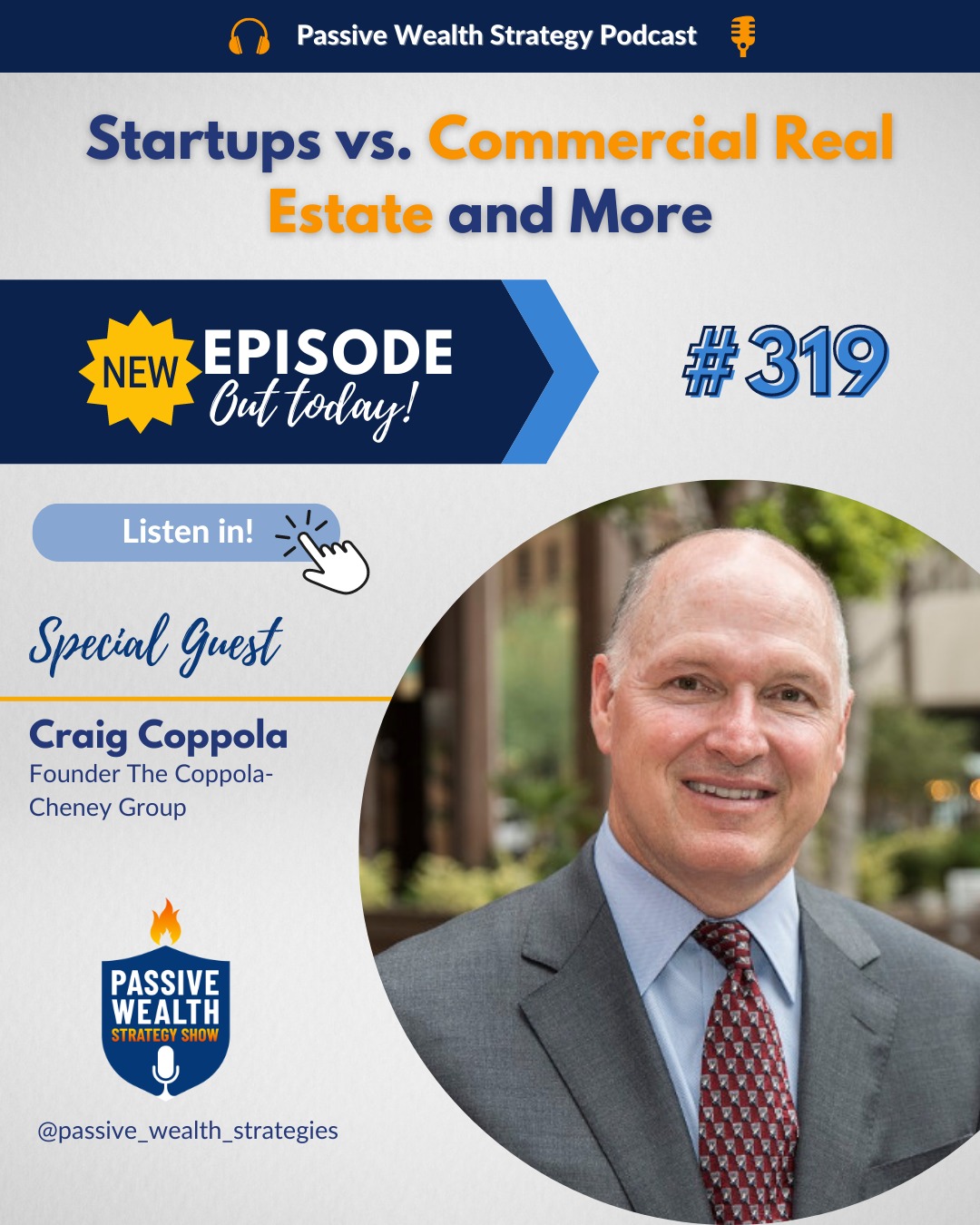
Startups vs Commercial Real Estate and More with Craig Coppola
I’m going to call you and go, Hey, drive by this apartment. I’m taking a look at it. I get those calls all the time. Hey, what about. I’m like, I don’t know if it’s in my world, my space, I’ll be able to tell it, but there is an expert in every marketplace. There’s an expert that you understand. And so you can be an expert in your niche.
Let’s say you want to buy mini self-storage. So I’m an investor in self-storage. But I only invest with these folks that only do invest in self-storage. So I don’t have to buy my own deals, even though I acquire my own deals by acquiring them in three ways. And I learned this from Bill Lee.
So let’s jump around here first, if I’m not investing my, in my own deal, I’m only investing with people that I know and trust, and they haven’t yet. So these apartment folks in Florida, or these mini-stories that we just invested, these guys have been building and selling self-storage for 30 years.
And I know them, they’re friends. I go to lunch with them. I call them Friday night. And so I trust them if it’s my own deal, then I only buy three deals. One as it’s off the mark. Too. There are three kinds of deals. There’s a market deal. There’s an off-market deal. And then there’s a wild view. And I’m only buying well deals.
I learned that from bill Lee, the founder of our company, and while deals go, I just can’t do it. So if I look back at my 25-year history of what I’ve acquired, all of my best investments have been deals that I’ve found that I knew that there was a market discrepancy and I did it because I knew the market.
And so that’s why I lead with, do you know what you’re looking for, where you’re looking for it and what the market is then you’ll know if there’s if it’s overpriced underpriced if it’s a discrepancy and you don’t have to take other people’s words for it.
I think it’s interesting that it’s three types on market off-market, and then wow.
DOK, a wild deal. It sounds like you go find it yourself. It’s neither on market nor off-market. It’s a, you’re creating it yourself.
Yes. So I’ve acquired on-market deals, but I’ve acquired them from a different angle. So it could be on the market. I’ll give you an example.
We just missed it. That’s in my crop. We weren’t, we were listing it’s the craziest thing. So what’s the hottest thing in the marketplace right now. Multi-family right. So we all go, Hey, if there’s one thing we want to do, we have the saying in real estate is dear Lord. Please give me one more cycle and I promise not to piss it away.
And if I add to that, it’s and I want it to be the multi-family cycle for the last decade because this is the cycle of all cycles. So we have this listing, it’s a, it was a two-story, 230,000-foot back-office building and our marketplace. We have a call center and we were trying to lease it over the last three or four years.
And we didn’t get it done in the building went for our client as brokers, we were trying to lease it for our client. The building goes back to the lender. He brings in new brokers and they’re selling it into the marketplace as a multi-family developer. They’re going to tear down the 238,000. Cause it sits, it’s got a huge parking lot.
So it sits on 15 acres. So they’re going to build this apartment and I’m just kicking myself saying that. In front of me and I missed this opportunity. I could have seen it. We could have obviously done the brokerage deal, but I could have been part of the development, the owners that owned it, we were just blindsided by it.
So to my point is I’ve acquired on-market deals. And I’ll later when you asked me what my best deal is, the best deal ever did was this on-market deal. But understanding that it was going to be something that.
I appreciate that. And I’m sure that is a, it sounds like it’s a tough lesson. You mentioned that sticks in your cross.
You’re not going to learn that twice.
You know that’s the other thing you learn, I’m 60, I just turned 60 in July. Nice for your audience, the lessons continue to come one. You just, you will always learn lessons. And the idea is this is great. I actually, now it’s I’m bummed.
I didn’t see it. I’m not bummed. I lost the fee cause it’s not as important to me, but it’s more important than I value. I pride myself on being someone who’s not just a broker, I’m a real estate acquire I’m somebody who thinks about this stuff. And I’m kicking myself only because I should have known that a deal architect.
This thing about the off-market has become, I don’t know. I don’t know if it’s been a buzzword for, the past 30 years, but it seems to me in the time that I’ve been a real estate investor quote off-market was like the secret word to make a deal sound awesome. It also became this quote off-market deal, the broker, sending it to, first, his favorite, whatever 10 people.
And then he sent it out through his email, but it’s still off-market. Cause it’s not a LoopNet yet. And I just think that’s, I don’t like that word. Really.
It’s the same thing. This is what, this is funny, the if you read every book what kind of car do you buy? You don’t buy a new car. You buy a two to a three-year-old car with 25,000 miles on it.
Because you can lose the depreciation that you drive off. The lot that’s full of a bunch of bull it’s bull wacky because I looked at it for my daughter. I was buying her car. And so we’re going in the car. The car was a brand new car was 37,000. The three-year-old car with 25,000 miles on it. It was 34,000.
I’m like $3,000. I get a brand new car. But that’s what’s happening in the marketplace, the same thing’s happening with your off-market. Yes. That’s why we don’t say, Hey, look, it doesn’t it’s on-market off-market, and wow. And as a broker, we’re into the off-market deal because we’re chasing listings, we’re chasing, we’re talking to people, but to your point, if you’re getting it from a broker, it’s not off-market, because the broker is there and he’s unless you’re his pal.
And I do see deals where they’re my past. And they will bring them to me. And I get to look at the first and I get the shot at doing it. So that, that is capable. And that’s part of this, know your niche, know your marketplace, know who the likely person is in that marketplace that could bring you an off-market deal and then go to them.
And if you read my book, you’ll see, go to that person and start saying, I will close. I will be your easiest customer. They the sellers of these properties are not looking. They’re looking to sell the property. They’re not looking if you can go to them and go I take every deal to Craig.
People come to me and they come to me for a reason. And Robert, we were talking about the Kiyosaki’s that they, when I used to be on the tour and talking with them, I used to say, I have this 62nd analysis and somebody sends me a deal. I can tell you in 60 seconds, whether or not it’s a deal. I’ve been doing it a long time, so I can do that.
So brokers like bringing me deals or other people like looking at deals cause I’ll look at a deal and go that’s I don’t like that for this reason. Or I like that. This is let’s get a little more information, but I’ll make a decision like that. And that really adds value. When you start talking to people, Craig doesn’t buy every deal, but the deals that he does buy, he knows exactly.
So do those criteria change over time. The market has obviously changed in the past, 30 years, but how much have you had to adjust those 60 seconds?
It’s not a stock, to every deal you look at separately, every deal you look at and you go, okay, this is what this is. You’re looking at multifamily, you look at different something that you’d be looking at many storages, you’d be looking.
So you just have to look at it and go, okay, what are those three, five main criteria for this product? And if you know it, because you’ve done the research on it, then, right away, this is not what I want. It’s too big for me. It’s too small for me. It’s too fast for me. It’s not, doesn’t have this.
And you can learn that over time when you should learn that over time that, that’s the other thing that we hear. It’s if you’re going to invest your money, be a professional about it, become a professional, don’t take other people’s word for driving the property. I can’t tell you how many times people are.
I got this an Escalade. Do you know where it is now, but I, it just sounded like a great deal. $48 afoot. I’m like, I’ve been in that building. It’s, there’s a reason it’s $48 afoot. It’s a piece of crap. And so it’s like the market’s crazy flushed with money right now. And so you really have to be cognizant and no.
Nice. Now I want to make sure, obviously, we have a finite amount of time here. I want to make sure we talk about startup investing and your experience there. And especially in light of comparing startups versus commercial real estate. Cause they’re completely different animals, but I know we have listeners out there who are looking at both and are trying to make a decision, which way does, so that’s a great point.
So I have three, I have a triangle inverted triangle. At the bottom is my commercial real estate brokerage practice and not the right upper right. It was my hobby and our real estate, which is acquiring real estate assets. And then the upper left is habanero ventures, which are acquiring startup and early-stage companies.
And so I’ve been doing both of these for 25, 30 years. And today I own about 40 different companies in this pump. So I have a fairly big portfolio. And what I have found is look, I, you can really, on this real estate side, you can really learn and you can create opportunities and you can do really well over a long period of time with your hard work and spending time on, and you can win at this marketplace.
It’s a complete crapshoot. I’ve done about a hundred deals. I own 40 today.
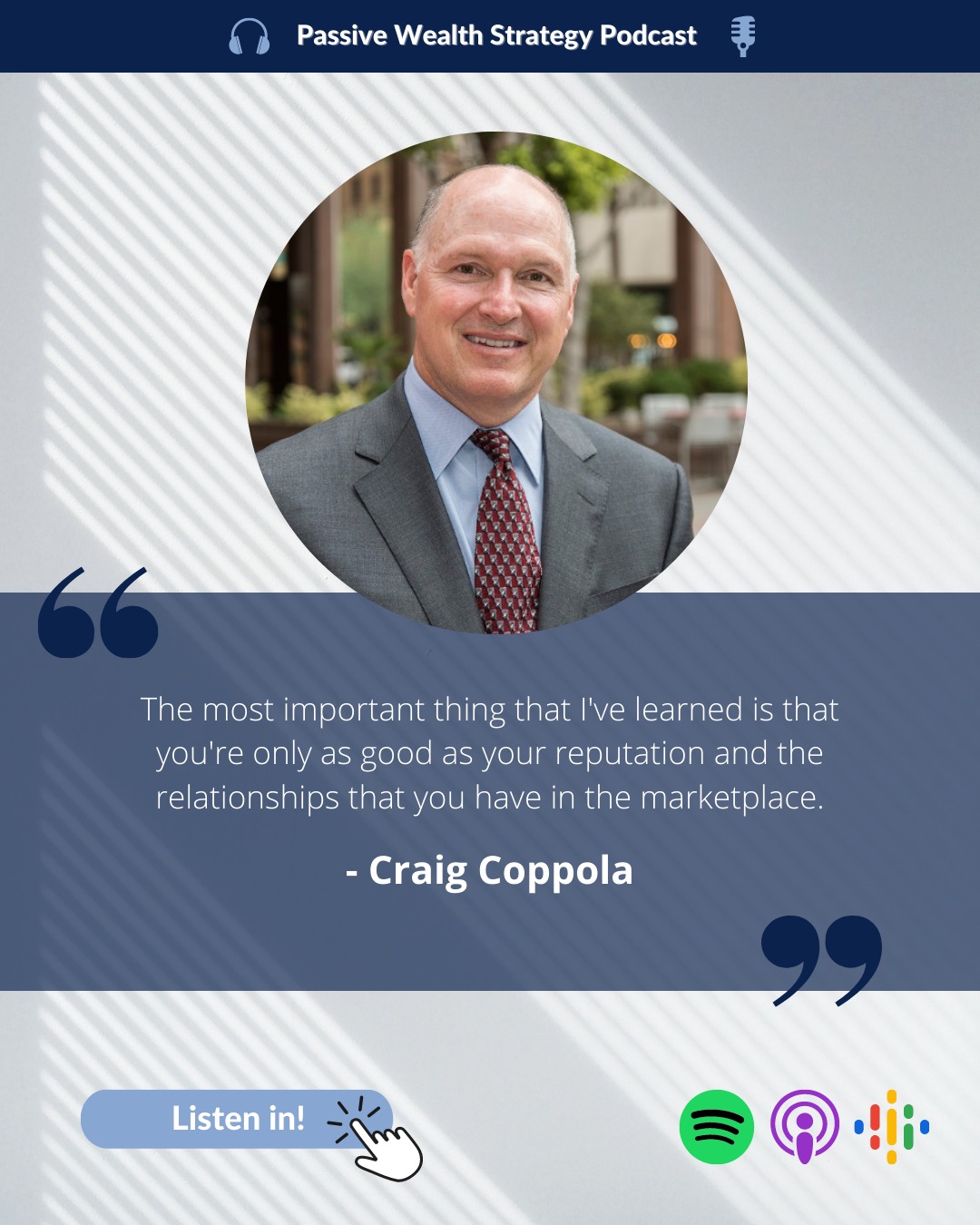
The most important thing that I've learned is that you're only as good as your reputation and the relationships that you have in the marketplace.
Craig Coppola Tweet
This being for start-ups I want to clarify for startups.
Yeah. In the startup business, I’ve got some stuff that I’ve learned. The first 10 deals I did within 24 months at all go bankrupt. And I was just committed to, I liked the process, but I had lost a couple of million bucks in the first years.
And. What am I doing wrong? So now I’ve been in it and now it’s the taken off, but you have to, you cannot do one deal in this startup, in my opinion, in the start, because you don’t know which one’s going to do. So you have to get a 10 or 15. So when you invest in this startup world, you have to say, I’m going to do 10 deals and put 25 or 50,000 and at least 10 deals and hope one of those will do.
Okay. And it’s, so it’s super risky money. Everybody talks about how much they did on it. And I’m doing great. Don’t get me wrong. But the first two years or three years, and it really, then the point where it actually crossed was. 10 or 11 years into the investing before I looked at it and went I’m doing okay at that.
And just in the last five years where I’ve said, this was a good thing to do, but I can tell you my financial advisor that has, the conservative money told me for 20 years, stop, you’re killing yourself. And then all of a sudden I hit, I hit a couple that finally paid off, Overnight successes that 15 years after you invested and you put 50 grand in it, they give you a check for half a million bucks, but it’s 15 years later and there’s plenty of, there are plenty of dead bodies along the way.
So if you’re trying to get in and you just want one out deal.
It’s a very tough business to do. So what industry are you are you focused on one industry with your startup investing or how do you diversify?
I’m a jockey investor, so I invest in founders. So as opposed to the company, so I’m across the board.
We have some fun ones. We have a company called nutty buddy which is a protective cup company that you wear. If you play baseball or lacrosse, Furniture company. We have, I have 10 or 15 tech companies that are software. I own, I just acquired a company. That’s in my space. You re your listeners should look at it’s called CRE one source.com.
So I own that. And its systematized automates deal flow. So if you’re chasing your deals, so for companies like yours as syndicators or whatever it is, do you all use our system? It’s a SAS product. So across that, You name? We’ve been pretty much in it, but it’s mostly because I invest in quality people that I want to buy it.
Sounds like, from the outside, it sounds like when you have to have an iron stomach to keep doing it because most people when they invest in a particular strategy and a couple go to zero.
They’re going to say, all right I’m done, I’m going to do something else, but if not, the first one goes to zero, but you stuck it out and found the way to be successful with it. As opposed to commercial real estate, it seems like the odds of anything can go to zero.
You can lose your investment in anything, but it seems like the odds it’s going to go to zero are a lot lower.
Yeah, I would say the worst loss that I’ve had on a real estate deal. I probably returned still 30 to 40% of money. And that, that wasn’t, it was for other reasons than the buy was really the great recession, took everybody down.
And so you have to look at those kinds of things, but yes, to your point I do the real estate investing way more conservatively. And I don’t think young investors are looking at the risks because right now the tech market’s on fire and the real estate market’s on fire. I talked to a young man yesterday who got out of college and he’s been trading stocks and this portfolio is up and he thinks he’s this algorithm.
And everybody is a hero. And I tell this story. If you got one second, so I’ll tell you the story about my dad being a baseball coach. And so the reason I played professional baseball is that my dad was raised in a house. I played for my dad. He was the high school baseball coach. And when he got inducted into the Arizona baseball coaches hall of fame, and then the night he got inducted, I said to my dad, I said, dad, you were a great coach.
Congratulations on your career. And he says, Craig, I was a great coach. And then my pitcher graduated. And I, it just hit me right there. It’s I’ve been in, I’ve been great, I’m the number one top producer ever at lean associates. There are a thousand brokers, but I, and I think I’m really good, but I’ve been in Phoenix, Arizona for 37 years.
The wind has been at my back. Of course, I’m good at it, I just hung in there and did that. So I would tell you that. This is something that, real estate, you can learn, you can get better at, you don’t have to risk all your money at, and you can start small. You can find your niche when you’re in a startup company.
It’s like you’re risking somebody else to make it happen for you. And I didn’t want that. So today when I invest, I’m an advisor of these companies and they pay me advisor shares. And so I have more than just written them a check and then I go away and hope it happens. I have some of them.
But for the majority, most of the companies I’m in, I am I’m on the speed dial of the CEO. And I’m making sure that I’m adding value because now I’ve, I’ve done. I’ve done this for a long time.
Nice. I like that. And so I feel like we briefly mentioned the great recession. I feel like it would be remiss if, before we go to the end of the show, if we didn’t at least touch on, your perspective, especially when I talk with guys like yourself with so much experience in real estate, been through a few markets cycles, you know what your stance is on where we are today.
Yeah. I think everybody would tell you that this is the craziest marketplace right there. If you’re looking at the debts, going crazy and interest rates are zero interest rates, low-interest rates, artificially own interest rates are driving commercial real estate values, and then inflation.
Everybody wants that inflation hits. We’re seeing inflation now. So there’s just tons of money that are coming into real estate, which makes it really scary. Not from a standpoint, can you still acquire stuff, but from what you have to pay for
this. So if you just look at the whole thing that’s going around, construction costs are going through the roof because the supply chain number delays land cost was up because there’s, it, depending on if you’re in a growing marketplace and it’s been a long run.
And then you look at there’s going to be a recession. Let’s just make that clear. If you don’t think this is different this time it’s coming. So if you’re acquiring real estate today, let me give you a tip. Do not acquire it with high leverage. You have to give yourself. And when I say high leverage is, I would say that I’m at 50, 60% on my real estate map.
And because you have to give yourself some credit and it’s not that you would lose the property, but if you have a lender, you’re not going to meet your lender requirements on debt, coverage ratios, and all of a sudden you’re going to be out and they’ll take the property back. You may not think they will, but they will.
And it’s one thing. That’s why I never, would invest in crowdsourcing. I’m not, I don’t know the people, I don’t know what the leverage is going to be. I don’t understand how they’re buying properties. It’s just different, I would acquire property. That I know, and that I want, and I would make sure that even in the downtimes, these properties.
That would be the least. So I like location on real estate as well. So the recession is going to come and whether it comes next year or two years, five years, you just have to be prepared. So when it comes, prices will drop
Nice. One of these days we’ll switch from COVID-19 what date? That year, maybe we’ll have COVID 20, 22 and that’ll be the cause of it.
Who knows? Maybe that’s too crass of a joke. All right. I certainly appreciate that right now. We’re going to take a quick break for ours. All right, Craig, I’ve got three questions. I ask every guest on the show. You know this, are you ready? Yes, sir. Great. First one. What is the best investment you ever made other than in your education?
So the best investment that I’ve made is with Robert and Kim Kiyosaki. And this is that when I was telling the story a little bit earlier back, 17, 18 years ago, there was a property in my marketplace at 32nd Camelback. Main street and the main street. Everybody knew it, it was a great marketplace.
It wasn’t on the corner, but it wrapped the corner. So it just, there’s a little shopping center on the corner, wrap the corner and it had a fitness place in it. At the time it was called a 24-hour fitness who ended up selling to LA fitness. And there was a 17 your lease in place and it was risky, not very good credit, but I love the real estate.
And I said if we can buy this, acquire that. Over time, this will be a fabulous location for somebody. So the point was we could buy it and take the risk that the tenant would stay there. But we knew that the real estate, so I took it to Kim and Robin, I tied it up, took it to Kim and Robert, and I said, I’d like you to be partners with me.
And Robert tells a story. So I’m not talking to him out of school here. Robert said we want it all. And I said, no I’ve got it. And he said, okay, how about if I do this, I’ll buy. And if you pay me back, my equity, I’ll give you 10% of the deal after that. So I said, okay. So he ended up giving it to them.
I got 10% of the deal with nothing in it. And then we started the lease and the tenant ends up staying for 17 years. We did a 15 year fully amortizing loan. Now. So two years before the lease was up, we owned it free and clear during the lease term, it had automatic kickers. So at the end of it, we were getting, I don’t know, a 20% cash on cash return of our investment.
Robert got his money back after about seven years and then started paying me, my Robert and Kim got their money and started paying me my 10%. When the lease was over 17 years later, we owned it free and clear. I took it to the marketplace. And we just finished and it’s under construction today.
We did a 99-year unsubs ordinated ground lease on a senior living facility. And they, the senior living facility, put 32 million in equity and another 80 million in debt. So we’re in front of the debt. So the hundred million dollars and we get 99 years of a cash flow that was about. 92% of their original investment every year for the next 90 years, 99 years.
So it’s a Homeland deal for everybody. And so that’s the deal, but it was to that point, it was in my marketplace. I knew it. I could see that long-term this is where to be. And it came to play. Now, there wasn’t, there was a lot of risk along the way, but it turned out great.
Nice and talk about residual income.
Passive cashflow, baby.
Yeah. I love that. We had the best investment. Now we go to the other side of that coin, the worst investment. What is the worst investment you ever made?
I put several million dollars in oil Wells with guys.
I didn’t know that those go away.
Yeah. And they were great guys. Somebody else introduced me.
I didn’t know him. So I, that was really, when I said I’m a jockey investor. I need to know them. I need to know them. They were fine, but they lived in Michigan. We were doing deals in Kentucky. It wasn’t their marketplace. It was the whole thing. In hindsight, you could just see the train wreck coming.
And I didn’t, and we were really close. It was funny. We, if oil, it stayed over a hundred bucks for another 12. I wouldn’t, it would have, my 3 million bucks would have turned it into a 30 million, $40 million deal in 12 months, but it didn’t, and it, the train wreck was there. So it was all the things that I’m preaching today.
Those are a couple of million-dollar lessons that I learned.
My favorite question here at the end of the show is what is the most important lesson you’ve learned in business and investing.
The most important thing that I’ve learned is that you’re only as good as your reputation and the relationships that you have in the marketplace.
I am shocked. I say this all the time. I would, I’m from Phoenix now. I live in Phoenix, Scottsdale, and I would never move out of here. I’ve spent 37 years building relationships and building my name when I’m not in the room. People are saying good things about me, regardless of whether it’s a deal or not a deal in the community.
And I think that I’ve spent all this time, so I can go out and have relationships with Kim and Robert, Kim and Robert and I have known each other for 25 years. And along with thousands of other people, and those are just relationships that I’ve built long-term over people. And I have that across the country with my people.
So I would say I learned early and I learned it every day. The relationships in my life matter way more today. Then the deal does. And so everybody says it, everybody here just listened to the 60-year-old guy saying, but I will tell you that building deep and meaningful relationships is absolutely critical in your career and your life and how happy you’re going through.
Nice. I love that. Craig, thank you for joining us today. Coming on this show has been so many lessons really appreciate that your time. If folks want to reach out, if they want to get in touch, if they want to learn more about what you do, any of your books, anything like that, where can they track you down?
So the best thing is if you go buy books, just go to Amazon and just type in our credit. Coppola, C O P P O L A, and then you can pull that up and you can Google me. I met Lee and associates. You can, I’m all over. The internet. I do have a couple of cool blogs ones in commercial real estate.
And so if you just go on there, my, and then I have a book that I wrote called the fantastic life. So if my commercial real estate one, if you go to, if you go to the coppolacheney.com, you can go on and you just sign up for our, what I call my narrative. And it’s pretty cool.
It talks about real estate and trends and where we’re going. And then my other one is called life fees, like selfie, www.thefantasticlife.com. And that’s I that’s every week, just a life lesson that I’ve learned. It’s pretty good people. I get great feedback from it. So it’s just something. I started doing it for my kids, and then it turned into this thing cause everybody was wanting it.
And so I just, I formalized at about eight or nine years.
Nice. That’s pretty cool. Great. Thank you once again for joining us today to everybody out there. Thank you for tuning in. If you’re enjoying the show, please take a moment and leave us a rating and review on apple podcasts. I appreciate that so much that helps other people learn about the show because that helps us rank higher in the apple podcast ecosystem.
And I’m always honest with you guys that gives me a nice little warm and fuzzy feeling because I get to see that you’re engaging with the content and you’re escaping and the wall street casino, along with us if you know anyone who could use a little bit. Passe wealth in their lives. Please share the show with them and bring them into the tribe.
Don’t forget to subscribe and that way you’ll catch us here every Monday, Tuesday, and Thursday. I hope you have a great rest of your day and we’ll talk to you on the next one. Bye-bye.

C2 Coppola Chenney
About our Guest

Craig Coppola
Craig Coppola has been a Commercial Real Estate office broker for over 35 years and is one of the eight Founding Principals of Lee & Associates Arizona. He is the highest producing broker in Lee and Associates’ 40+ history and has completed over 3,800 office space transactions.
Within Lee & Associates, Andrew Cheney, Gregg Kafka and Craig lead The Coppola-Cheney Group. The Coppola-Cheney Group is the number one office leasing and sales team in Lee & Associates’ history. We provide a higher level of brokerage skills, market knowledge, and the ability to negotiate our clients’ transactions.
Episode Show Notes
Craig Coppola has been a Commercial Real Estate office broker for over 35 years and is one of the eight Founding Principals of Lee & Associates Arizona. He is the highest producing broker in Lee and Associates’ 40+ history and has completed over 3,800 office space transactions.
Within Lee & Associates, Andrew Cheney, Gregg Kafka, and Craig lead The Coppola-Cheney Group. The Coppola-Cheney Group is the number one office leasing and sales team in Lee & Associates’ history. We provide a higher level of brokerage skills, market knowledge, and the ability to negotiate our clients’ transactions.
[00:01 – 05:28] Opening Segment
- Get to know Craig Coppola
- Who is Craig Coppola?
- “I wanted a career where I could dictate my own career.”
[05:29 – 11:09] How to Win in Commercial Real Estate
- Get a copy of How To Win In Commercial Real Estate Investing
- Everybody wants the magic bullet so what’s the secret?
- There is an expert in every marketplace
- Why Craig is not investing in deals but with people
[11:10 – 26:03] Startups vs Commercial Real Estate and More
- Investing in Three Types of Markets
- The Lessons Continue to Come
- Craig shares the advantages of investing in off-market deals
- Startups versus Commercial Real Estate
- Craig’s Inverted Triangle
- Jockey Startup Investor
- Which one is riskier? Which is the one for you?
- Craig’s Perspective on the Great Recession
[26:04 – 36:34] Closing Segment
- Quick break for our sponsors
- Groundfloor offers short-term, high-yield real estate debt investments to the general public. Check www.passivewealthstrategy.com/groundfloor/ to get started.
- What is the best investment you’ve ever made other than your education?
- At 32nd Street and Camelback
- Craig’s worst investment
- Several million dollars into oil wells with strangers
- What is the most important lesson that you’ve learned in business and investing?
- “You’re only as good as your reputation and the relationships that you have in the marketplace.”
- Connect with my guest. See the links below.
Resources Mentioned:
Tweetable Quotes:
“One of the key things is [to] start developing what you want to buy and developing the relationships of people that you trust.” – Craig Coppola
“If you’re trying to get in (startup) and you just want one out of a deal, it’s a very, very tough business to do.” – Craig Coppola
“I invest in quality people that I want to bet on.” – Craig Coppola
————
Connect with Craig Coppola through LinkedIn or through his websites https://www.coppolacheney.com/ and LIFEies.com. Don’t forget to grab your very own copy of The Fantastic Life!
Invest passively in multiple commercial real estate assets such as apartments, self storage, medical facilities, hotels and more through https://www.passivewealthstrategy.com/crowdstreet/
Participate directly in real estate investment loans on a fractional basis. Go to www.passivewealthstrategy.com/groundfloor/ and get ready to invest on your own terms.
LEAVE A REVIEW + help someone who wants to explode their business growth by sharing this episode or click here to listen to our previous episodes

